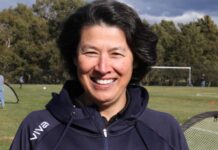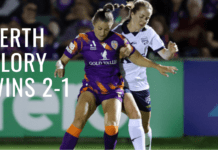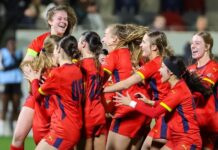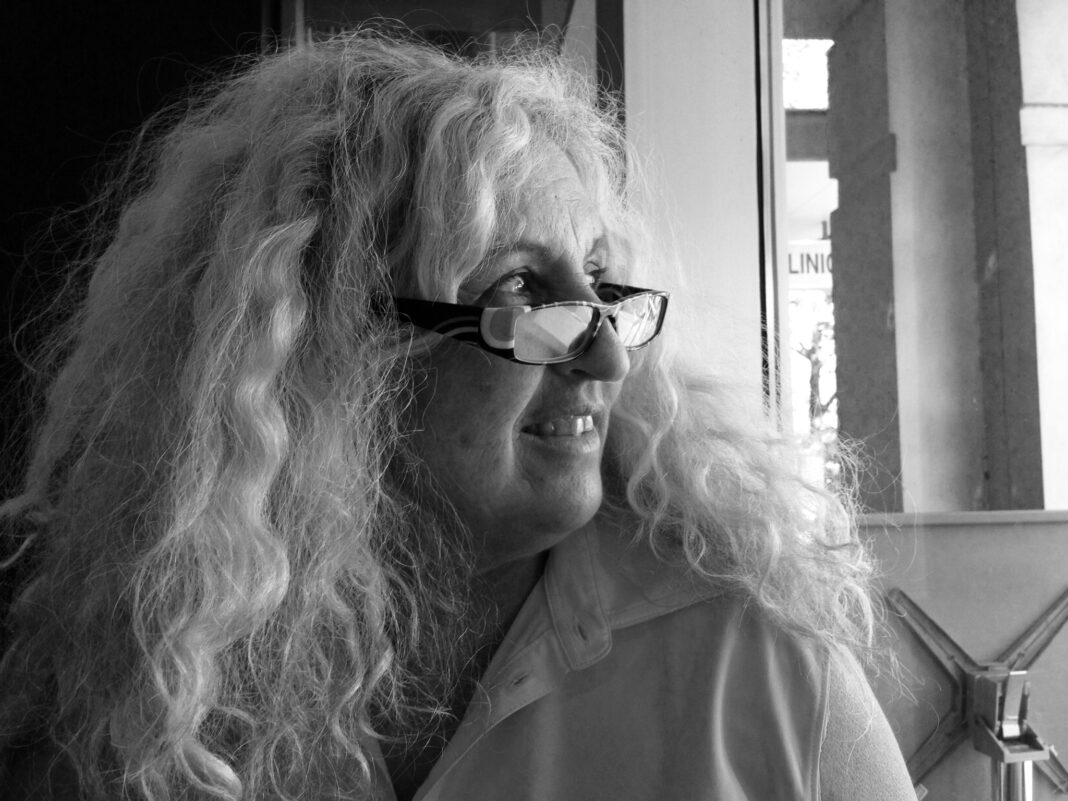
Jenny Williams has been part of some quite incredible advances for women’s sport in South Australia.
A pioneer for women playing football, Australian Rules, lacrosse, cricket and touch rugby, Williams now working with Adelaide United’s W-League and A-League teams on their psychological approach to the game.
Across a playing and administrative career spanning almost 40 years, Williams has a highlight reel most athletes wouldn’t dream about, let alone compare their own to.
“Winning the Marg Ralston Open Door Award for starters. It’s about creating opportunities, not for myself but for other people. Also being involved in co-founding the South Australian Women’s Football League.”
“I was pretty proud when women got a presence at Adelaide Oval. Standing out on Lefty’s Lawn with Jill Kennare (who, among other achievements hit the winning run for Australia when they won the Women’s Ashes against England in 1985 for the first time since 1949). She actually played with me at club and state level. She also played soccer too with me as a goalie and she was amazing!”
“Ensuring optional helmets were brought into lacrosse. America changed its game to follow a lot of the same things that we did.
“Winning AFL Woman of the Year in 2003 meant being recognized for all the things that I have done and tried to do was really cool. Interestingly enough, I didn’t know I won it and I went over as the only person in the room from Port Adelaide, so not even Mum and Dad were there.”
For all the plaudits and accolades she’s received later in life, Williams’ love of sport came from the simplest of joys – sharing the experiences with her friends and family.
“I’d always play with my brothers. I had a netball and two pine trees out the back and they made a perfect distance for a soccer goal. So as a kid, despite living in an AFL house, we all watched and played soccer.”
“We were pretty lucky as a group from teachers’ college. We played every sport we could to see what we could win but also as a group of friends to experience it because we taught it. We thought we’d be better teachers for experiencing the sport.”
As well as better teachers, Williams and her team found themselves among the best teams in South Australia, and the wait for silverware wasn’t a long one.
“One of the women from the year below was Karen Ford; her dad, Tom Ford, was coaching what was equivalent to one of the top league teams then, and it was fantastic as we had some experience in our team in Lyn Baker who had come from England and there were some other fantastic players that we played against,” she said.
“So, we were the upstarts! We came and won the Premiership for three years and also won the Ampol Cup. We played in front of a lot of people sometimes as the men played after us at the old Olympic Sports Field.”
While that affiliation with the men’s sides helped the women’s teams on the pitch, there were still plenty of challenges off it, especially as teams looked to compete at a more elite level.
“I didn’t find that we had too much negativity because most of the guys thought it was a good idea to help us train to get better. The big thing for me was that I had a boyfriend who liked Tottenham Hotspur at the time, so he was quite happy to come out and do some training.”
“We trained with the guys all the time and I really quite liked it. To get better we would play under-14 and under-15 boys’ teams – the state boys’ teams.”
“One of our hardest experiences was that we never had changing rooms, we always had to get changed in the car park. There was also no player pathway. We played state games; we went up to Darwin and stayed in the worst accommodation available. We also played here in Adelaide and my best return was two volleyed goals one year.”
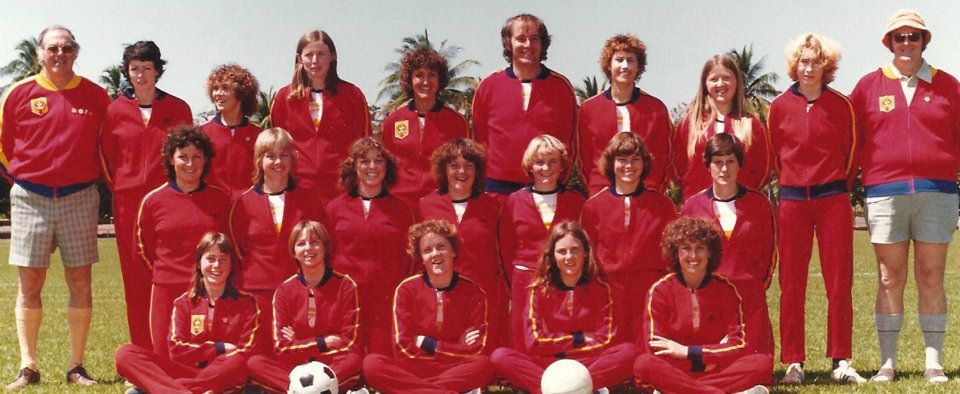
That lack of progression from elite juniors to the senior ranks, and perhaps into the international arena, was one of Jen’s biggest hurdles as she reached adulthood.
“There was no pathway for an Australian team. There was no Women’s World Cup then and that really influenced us. A lot of us loved playing and we had a great time, but we would train, then play lacrosse on a Saturday afternoon, [and] soccer was on Sunday. If things were different, I might have played soccer for longer.”
“One of the nicest things was [ex-Matildas player and former FIFA Council member] Moya Dodd saying to me that she thought we were really good players. She said she couldn’t believe how good we were! That was a really good compliment.”
As her playing career wound down, Jen played a key role in the foundation of the South Australia Women’s Football Association, looking to provide an opportunity for young Australian Rules footballers that she wished she’d had herself.
“I was women’s advisor at the time and in 1990 a woman came to us and asked if I would like to get involved with helping her start women’s footy as she would like to play. Her name was Gina Dutschke.
“We started by having some trial games and then we had a state game against Victoria on 9 September 1990 which was really quite good fun. We had lots of publicity; articles in the paper and coverage on the TV. We picked an all-star team and played at Glenelg Oval.
“They gave us the old state guernseys to play in, but that didn’t fuss us at all. We had so many sisters and relatives of really good players. I have to mention one woman who played lacrosse with me, Deb Walker, she broke her leg in the first five minutes.
“We won easily by 11.12 (78) to 0.9 (9) but Victoria went into the game thinking that they were going to kill us, largely because we didn’t play all the time. I was voted Best on Ground which was pretty cool.
“Actually, if there was one player who I could have put in the team who didn’t play it was [world number one squash player] Vicki Cardwell. Her and Jill Kennare would have been the two best women’s footballers that I’ve seen along with present-day star Erin Phillips, so there were some really good players.
“From there, we set up a state competition with six to eight teams and it lasted for a while like that. The big problem was though that a lot of us were playing other sports at the same time and went to World Cups, so it wasn’t viable for some players. Yet the competition went on for ages with either more or less teams despite having no support from the SANFL [South Australian National Football League].”
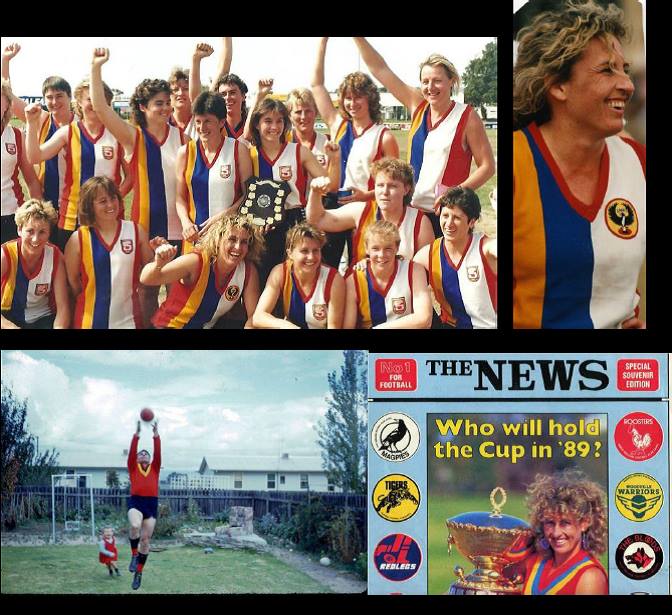
“I also started Year 12 AFL Football in schools and had around 600 kids compete in that as a Year 12 subject. They do that in Victoria and it doesn’t happen anymore in South Australia, unless of course they are at a specialist school.
Having been involved in so many sports at a high level, Jen has faced some difficult times, for her being at the centre of the lacrosse helmet debate was her toughest period.
“In lacrosse, we won three Premierships in a row and we were up for a fourth but had to forfeit due to the helmet debate, where women were not allowed to wear helmets for protection, so we had to forfeit the competition.
“I was a good enough player to captain Australia in lacrosse despite the fact that we wore helmets because we believed in player safety and looking after our eyes and being aware of concussion long before anyone else was.”
Williams freely admits that, while she’s been sidelined throughout her playing and administrative for looking out for herself and her teammates, she’s learned that fighting for what you believe in is just as important as winning trophies and accolades.
“In Australian Rules football, I can’t believe how many times I was told that I was not strong enough with men or too strong with men, or ‘you did your job really well, but we want to go in another direction’. Largely because any time you have an opinion it is an issue. I was put up by [Port Adelaide AFL club CEO] Brian Cunningham to go on a Junior Panel, [but] was told that ‘we’ve already had ideas, we don’t need anyone like you in it’.
“But what it taught me was resilience. That’s how you get through it. You also get through it by having good people around you. I was once told that I wouldn’t be good enough for a job, I actually went back to uni to do my Masters and then wrote back to SANFL and told them that I thought their whole process was flawed. So if you are going to complain, make sure you are more talented and more qualified than them and stand up for yourself.
“I had a Mum who was like that and my brothers would help me. Financially, it always cost us a lot of money to play sport. Airfares were huge. We were lucky that we went on a program for lacrosse. All the sports science was thrown in, sports psychology too, it was fantastic. It really helped us get through things. Also I need to give a shout out to my brother [and Port Adelaide AFL premiership-winning coach] Mark who when I was named as Australian lacrosse captain, he gave me $10,000 because, as he said, ‘if we’d been boys, we would have made a lot of money out of our sport’.
“What gets you through tough times is learning to be a little bit tough yourself, but also having the best group of friends around the place.”
In all her experiences across so many different sports, Jen had some real high points in her playing career.
“Playing Touch (rugby) and winning every competition for five years – the same with lacrosse, soccer and cricket. There was this group of women who are still my best friends. Imagine winning everything with your best friends and still being that these days.
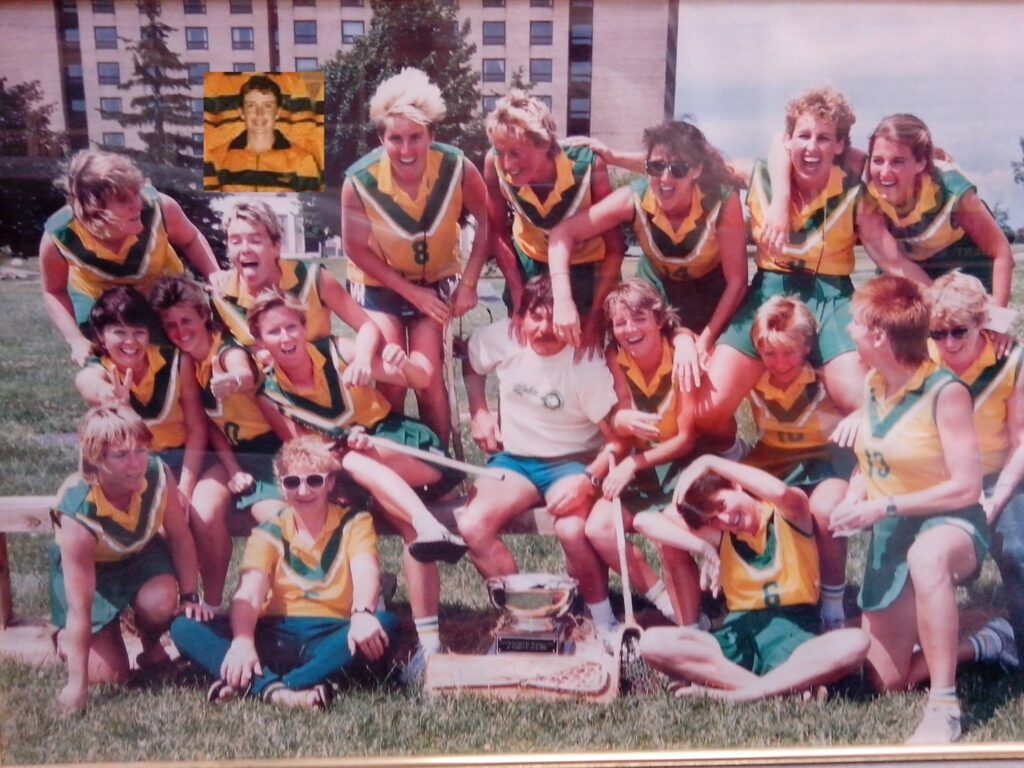
“We won a World Cup in lacrosse, but the reason it was really great to win a World Cup was because of who was around. We decided that if we wanted to be the best, let’s do it together.
“I do like trying to be the best and I do like being the captain and helping other people. I think my greatest achievement is making people playing around me feel like they can play out of their comfort zone and they end up being really good.”
Bringing the story up to the present day, and Jen is still a big part of the women’s sport scene in South Australia. Her latest role is with Adelaide United’s W-League and A-League players. It came about in a rather unusual way.
“Well, Covid happened, and my brother Mark and I were writing a children’s book together. We had written one in 2004 when Port Adelaide Power won the Grand Final, ‘The Night Marcus Won The Flag’. With Covid, Mark was at home without a job and I was doing a fair bit at home too, so we not only looked at that book and re-wrote it with an Indigenous person as the hero and as well as just boys, it has girls in the book.
“I’d already written a soccer one a long time ago and not followed it up, so we took the time to follow it up and get it done with girls in it. I went to show the soccer book to Bruce Djite, the director of football at Adelaide United. I also left him my book ‘Think, Prepare, Play Like A Champion’. Bruce is a smart guy, I sat with him and Nathan [Kosmina, CEO of Adelaide United]. The reason Adelaide United will do well is that they don’t think like everyone else. They don’t act conservatively. We talked about a lot of stuff and they took a liking to what I was saying.
“When I went back to pick up the book, there I was in the room with Carl [Veart], Eugene [Galekovic] and Ross [Aloisi]. They seemed pretty chuffed that I knew who they were. We talked and, rather than words on a wall, I believe that when we are talking about being a champion, part of being a champion is about being motivated and loving what you do. If you want to be great, do it together.
“Then what happened was I ran some sessions with the men’s A-League side and I was then called and told they’d really like it if I could offer it to the Adelaide United W-League players too. I had been trying to work with the women there for a couple of years and had never heard anything back and all of a sudden I got to do it.
“I got to learn a whole load of players names, male and female, I went to all of the games because I think if you do leadership with the club you’ve got to be involved in it, you can’t just sit back. You have to share your life with it. You have to help people to understand that there will be hard times, we all go through it, but there has to be genuine care for each other and care to make yourself magnificent – that’s what we want.”
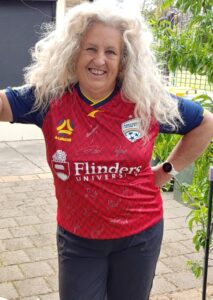
Adelaide United are known for aiming to treat their men’s and women’s teams equally. Jen sees the present trajectory as highly promising.
“They are on their way. This year they did combined training and took pride in the men’s and women players finding out about the people who played in their position for the opposite team and what they do. It’s not token. It was great to see so many of the A-League players turn up at Marden to watch the W-League games. Jacob [Melling] turned up with his daughters and he was saying ‘This is what you want, this is what you want to see, people doing really well.’
“The redevelopment of Hindmarsh Stadium is something I’m writing a paper on. There is no use doing it and saying it’s for the Women’s World Cup and how great it will be if it can’t be used all the time [for the W-League].
“I took so many people to the Adelaide United W-League game there against Western Sydney Wanderers [that broke the attendance record for a stand-alone W-League game]. But that wasn’t the only time my whole group went – we watched the women every week and we took a great deal of pride in watching them and getting to know them. It was funny watching [Australian Olympic hockey player] Sandy Pisani barracking for Cote [Rojas] because they both wear number seven, it made me so proud to see how we were putting generations together.
“The problem is that it’s too far to go to watch the W-League at Marden. There is no replay screen there, the pitch is good and it is fun, but if we are going to have a major stadium, both our men and women should be training in it and you should be able to open just parts of it, so it may be that you just have the changing room side open. You should be able to invite bands to come and play if it is thought too expensive to open things up. We have to think of a way to do it well instead of just going ‘Oh yes, we’ll do it for the World Cup’ and then scatter the Adelaide United teams everywhere.
“In terms of further equality, I am of the view that we should sign people earlier, put the squads together earlier so that the girls know what is going on. They are working and they get paid. They have to take some time off work and train so hard and all of the sudden they are told they have to fly off here and play, it is really difficult to keep a job. All of these things need to be looked at to see how we can make these women’s lives as easy as possible and making it so they can still get joy. You should never be playing elite level and it is not fun.”
While Adelaide United have just come off the back of their greatest ever W-League season, Williams looks back on her work with the women’s side, and knows there’s more work to do next season if the Reds are to finally play finals football.
“For me, everything is a bit of a learning curve. It was great to be able to talk the Adelaide United’s W-League leadership. Dylan Holmes was an absolute gem. I would discuss what I had seen in sport and how I could help. I could then feed things back to the hierarchy and be able to talk to the coaches and give feedback.
“To start off with, we discussed how to improve ourselves and the people around us and the group as a whole – how can we learn to play well. When I learned was that I needed to talk about away games, making sure we did that better. We won all the home games except for one. When we are away we need to understand how to facilitate wins there too. As long as I am involved, never again will we allow our fortunes to rest on the outcome of two other teams [after missing the finals on goal difference].
“To sit with the whole team watching Sydney and Canberra United play a 0-0 draw was so sad. I’ve read a lot of things about Freakonomics when you look at situations like that. Basically, neither of those two teams needed to win to achieve what they needed. When they played each other the following week in the Finals, the score was so different, you can see how motivation changes things.
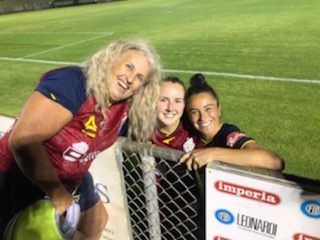
“I honestly think that if Adelaide United had made the Finals this year, they would have given things a real good shake. Hopefully next season Dylan [Holmes] will be back and having Cote [Rojas] this year was a really good thing because she brings a real mixture of skill and speed.
“I love watching the young ones get better. I love watching people competing for teams, going out there showing the coaches exactly what they can do and most of all the fact that there was so much joy all year. There was disappointment at the end, but we are breeding a group of women who want to be together and want to show people that they are there and are serious and are actually going to give things a shake. Look out for Adelaide United next year because that is going to happen.”
And like during her playing career, Williams has still more goals she’s yet to cross off her lengthy to-do list.
“I want to be associated with the Reds when they reach the Finals for the first time because they deserve it and I think I can contribute towards helping them get there. I really like working with the A-League team as well. Everyone talks about having equality and all that, but have a look – I would dare say that I am the only female person being entrusted to look after team psychology and that’s a pretty amazing thing.
“You want to make sure that your athletes understand the choices that they have. To have a choice of who you want to work with, who is going to work hard enough, who will be the people who help others, who is willing to really go out of their comfort zone to be better all the time.
“I’ve introduced my athletes to people like [Israeli expert on the psychology of judgement and decision making] Daniel Kahneman and things like Freakonomics and Soccernomics – a whole lot of other areas… Daniel Kahneman won a Nobel Prize in 2002 for Economics for teaching people how to think, how to do it better.
“We can learn from the past, we can learn from the smartest people. The more we teach people and the more we want them to stand out and be brilliant and prepared to back themselves, within a framework where you have success and enjoy things. We win things together and finally, you end up being [such] good friends.
“I just want people to have the experiences and enjoyment that I had in sport whether it be male or female. Men respect women who know what they are doing. I want to thank Adelaide United for giving me this chance and I’m hoping that I am doing a good enough job to get a chance with them again next season.
“I was delighted that Adelaide United’s A-League side made the Semi-Finals this season. All the guys involved know how to make people better. People don’t get to live their lives over again – make it great, enjoy it and be great coaches.”


